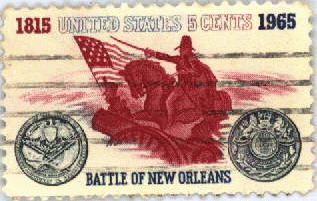Andrew Jackson 1767-1845 A brief biography
A National Hero - The Battle of New Orleans, Winter 1814-15

Winter 1814-15
In late 1814, the British opened a two pronged attack on the U.S. Coming up the Chesapeake, they ran the government out of Washington City (as it was called then), burned much of the city, including the White House and the Capitol, and shelled nearby Baltimore.They also planned to invade from the Gulf of Mexico, where the greatest prize was New Orleans, controlling sea access to the Mississippi, the water highway of the states. The British commander, Cochrane, felt the area could be taken with minimal forces with the help of the Spanish and Indians.
This was now Jackson's theater of operations, and he first took the offensive, capturing parts of Spanish Western Floridas, adjacent to New Orleans.
In New Orleans, he set out, with his soldiers and locals, to organize a strong defense against British attack. He dazzled the local society which, expecting a backwoods wild man found him to be a man of poise, relaxed style and charisma.
Jackson called a conference of engineers to find out how best to seal off New Orleans from invasion. As New Orleans was largely surrounded by swamps, one method was to fell huge trees to clog the smaller waterways leading to the city. This was done, but not thoroughly enough, so the British did come through in boats.
Jackson also accepted the services of Jean Lafitte, a famous local pirate, and 600 free blacks of New Orleans, and brooked no criticism of the use of the black volunteers.
In the climactic battle, Jackson used some 3,000 men,
with carefully dug fortifications, to hold off approximately twice as many
British troops who made a massed assault, taking over 2,000 casualties,
while the Americans sustained 13 killed, 39 wounded, and 19 missing. The
British dead included the top commanders, and the troops fled in a rout.

As it happened, a treaty was signed, in the Netherlands, before the battle in this age of slow communication. But most Americans heard about New Orleans first. The U.S. had declared war, lost much, fought for the most part incompetently, and had to sign a treaty ratifying the old status quo. The battle was thus an enormous boost to U.S. morale, and was the main personal factor that put Jackson in the White House 14 years later.
It also was a show of strength by a formerly weakling nation, increasing the United States' negotiating powers with Spain, Mexico, and Britain in the future.
Jackson maintained martial law in the territory until the official end of the war. He was at first idolized in New Orleans, but lost much of his popularity due to the harshness of his regime, and such acts as jailing a legislator who published a "subversive" article, and a judge who tried to rescind the jailing of the legislator.
